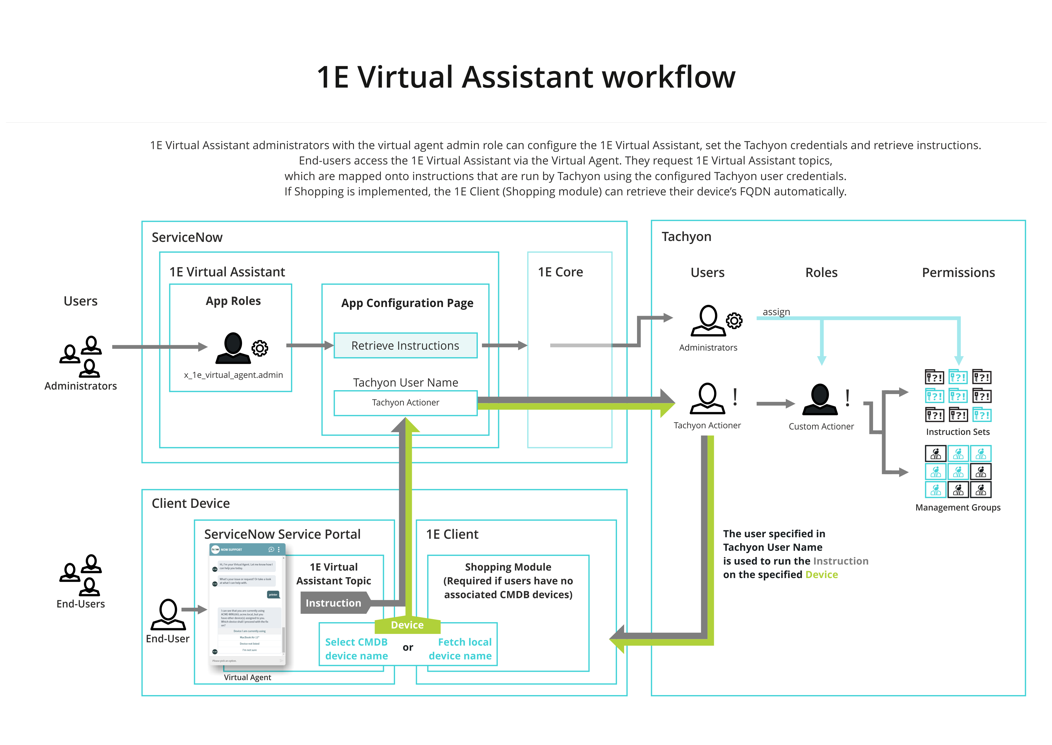Fundamentals
An overview of the fundamental concepts and terminology needed to understand what will do for you.
Integration between ServiceNow Virtual Agent and 1E
uses the 1E Platform to automate some commonly requested IT functions and then integrates those into the ServiceNow Virtual Agent as topics, so they can be requested by users without having to go to their IT department.
Configuring the
The relies on 1E Core to handle communications with a working 1E infrastructure via a MID Server that must be configured to allow the ServiceNow cloud instance to access the network where 1E is installed.
A administrator configures the by setting the 1E User Name parameter on the App Configuration Page to the name of an existing 1E user. This user must have been given global actioner permissions in 1E or sufficient permissions to run all of the associated instructions used by the topics on all of the end-user devices where the 1E Client is installed.
Using the
An end-user accesses the Glide Virtual Agent in the ServiceNow Service Portal from a browser on their device and starts a chat to report an issue or make a request. As part of the chat, they select a topic. These are seamlessly integrated into all the other available topics, so the end-user doesn't necessarily know that they are accessing a one.
The 1E Shopping module in the 1E Client can be used to automatically determine the FQDN for the device where the end-user is browsing to ServiceNow from.
If Shopping has not been implemented
When an end-user interacts with a topic that is associated with a 1E instruction, the system will need to know where to run the instruction. The end-user is then asked to select from a list of any devices previously associated with them in the ServiceNow CMDB.
If no devices have been previously associated with the end-user in the ServiceNow CMDB, any topic that relies on 1E cannot be run.
If Shopping has been implemented
Implementing Shopping requires:
a working implementation of 1E Shopping
the local 1E Client has the Shopping Module enabled
the integration between and Shopping has been configured.
The following options are then presented to the end-user when selecting a -related topic in the :
If there are no devices associated with the end-user in the ServiceNow CMDB the will automatically select the FQDN name for the device the end-user is browsing to ServiceNow from
If there are devices associated with the end-user in the ServiceNow CMDB the end-user will be presented with a list of devices to choose from, this will include the FQDN name fore the device the user is browsing to ServiceNow from.
When the knows the device, either through user choice from options configured for them in the ServiceNow CMDB or by the Shopping agent automatically determining the device's FQDN, it gets 1E to run the instruction, along with any other parameters gathered during the chat, on the selected device.

Terminology
An overview of the basic terminology used when referring to functionality.
Term | Description |
|---|---|
Topic | An item that can be selected by a user from the ServiceNow Virtual Agent. The provides a number of sample topics that are integrated into the ServiceNow Virtual Agent. |
1E | A 1E product that has the ability to run instructions on all the connected devices in a network to perform actions or get responses in real-time. has its own custom set of 1E instructions that perform commonly requested IT functions. |
Shopping | A 1E product that provides self-service functionality, so that users can request software themselves, have it approved and installed automatically - thereby saving IT the time and money of dealing with the request manually. The Shopping client module of the 1E Client also provides a mechanism for fetching the FQDN of a device, allowing the to know what device a user is browsing to ServiceNow from. |
1E Instruction | A 1E Instruction is something that 1E runs on a device to retrieve some information or perform an action. |